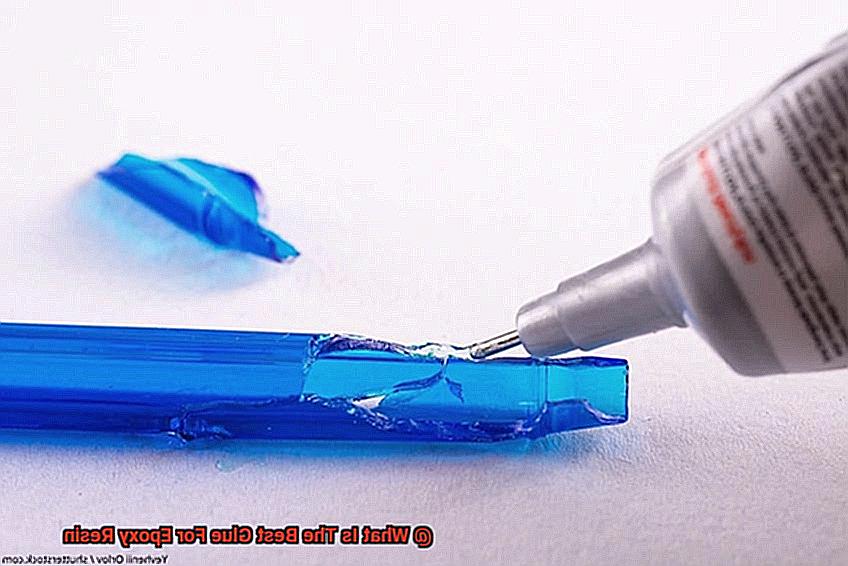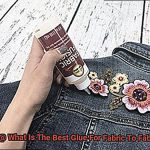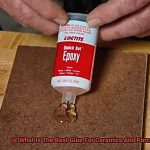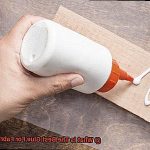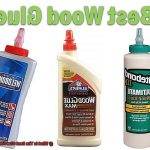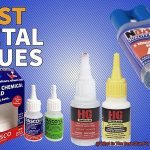Are you a DIY enthusiast or an artist who loves working with epoxy resin? Do you find yourself struggling to find the perfect glue to bond your epoxy resin projects? Worry no more. This blog post will be your ultimate guide on what is the best glue for epoxy resin.
Epoxy resin is a versatile material that can create stunning glossy finishes. It’s perfect for making jewelry, art pieces, and even large home decor items. However, choosing the right glue is crucial in ensuring that your finished product looks neat and tidy.
But with so many adhesive options out there, it can be overwhelming trying to find the right one. That’s why we’re here to help. In this blog post, we’ll delve into the factors you need to consider when choosing the best glue for epoxy resin projects. We’ll talk about adhesion strength, curing time, and waterproofing.
By the end of this post, you’ll have all the information you need to select the perfect glue for your next project. Whether you’re a beginner or a pro, our tips will help you achieve seamless and professional-looking results that will last for years.
So if you want to take your epoxy resin game to the next level and create stunning pieces that stand out from the crowd, keep reading to find out what is the best glue to use.
What is Epoxy Resin?
Contents
- 1 What is Epoxy Resin?
- 2 What Types of Glue Can Be Used for Epoxy Resin?
- 3 Cyanoacrylate (Super Glue)
- 4 Two-Part Epoxy Glue
- 5 Polyurethane Glue
- 6 Factors to Consider When Choosing the Best Glue for Epoxy Resin
- 7 Tips for Using Epoxy Resin with Different Types of Glue
- 7.1 Choose the right glue based on the materials you’re working with
- 7.2 Ensure clean surfaces before applying glue and epoxy resin
- 7.3 Follow instructions carefully for both glue and epoxy resin
- 7.4 Do research or testing before committing to a particular glue
- 7.5 Use glue sparingly and test bond strength before using your project
- 8 Benefits of Using the Right Type of Glue for Epoxy Resin
- 9 Conclusion
Epoxy resin is a powerful and versatile adhesive that has gained popularity due to its ability to bond strongly to a wide range of surfaces. This unique polymer is created through the combination of two components, specifically the resin, which is a thick, viscous liquid, and the hardener, which is a non-viscous liquid. When these two components are mixed together in a precise ratio, they undergo a chemical reaction that results in a hard and durable material.
One of the key properties of epoxy resin is its resistance to water, chemicals, and heat. This makes it an ideal material for use in harsh environments such as marine applications or automotive repairs. Additionally, epoxy resin is known for its excellent bonding strength and durability, making it perfect for larger projects or surfaces that require long-lasting adhesion.
When selecting the best glue for epoxy resin, there are several factors to consider. One popular option is cyanoacrylate or super glue, which dries quickly and can bond a variety of materials. However, it may not be suitable for larger projects or surfaces as it can dry too quickly.
Another popular option is two-part epoxy glue, which consists of two components – a resin and a hardener – that must be mixed together in specific proportions before use. This type of glue offers excellent bonding strength and durability, making it ideal for larger projects or surfaces.
Polyurethane glue is also a suitable option for bonding epoxy resin. It is a waterproof adhesive that can bond a wide range of materials, including wood, metal, and plastic. It offers excellent bonding strength and flexibility, making it ideal for applications where movement or vibration may occur.
What Types of Glue Can Be Used for Epoxy Resin?
Epoxy resin is a versatile material that can be used for a variety of projects, from coating surfaces to creating jewelry. However, choosing the right adhesive is crucial for ensuring that your project stays intact. With several types of glue available, it’s important to consider the materials you are working with and the strength of bond required. Here are five sub-sections explaining the different types of glue that can be used for epoxy resin:
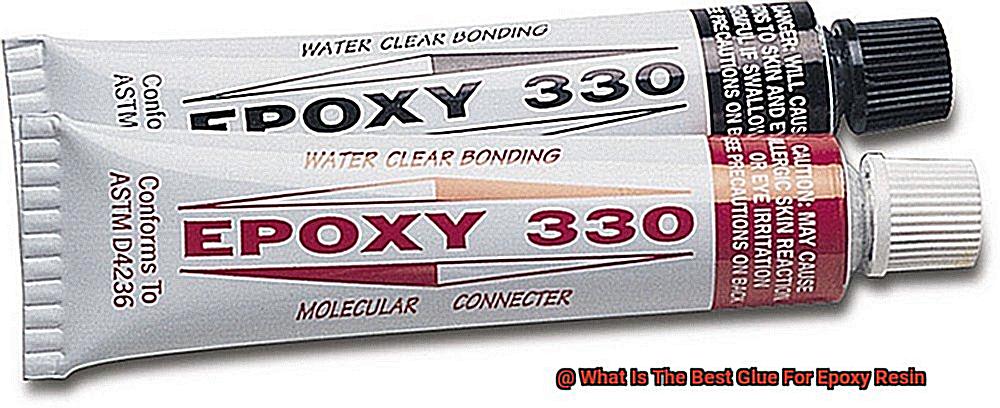
Super Glue
Also known as cyanoacrylate glue, super glue is a fast-drying adhesive that creates a strong bond between surfaces. It’s ideal for bonding small pieces together, such as jewelry components or small parts in a model. However, it’s important to note that cyanoacrylate glue can be brittle, so it may not be the best choice for larger projects or items that will be subjected to stress.
Epoxy Glue
Two-part epoxy adhesive is specifically designed to work with epoxy resin and creates a very strong bond. It consists of a resin and a hardener that must be mixed together in specific proportions before use. This type of glue is ideal for bonding larger pieces together, such as furniture or sculptures. Two-part epoxy adhesive takes longer to dry than cyanoacrylate glue, but it creates a more durable bond that can withstand stress and wear.
Polyurethane Glue
Polyurethane adhesive is a waterproof adhesive that can bond a wide range of materials, including wood, metal, and plastic. It offers excellent bonding strength and flexibility, making it ideal for applications where movement or vibration may occur. Polyurethane glue is a good choice for bonding wood to epoxy resin.
Silicone Glue
Silicone glue is a flexible adhesive that can be used on surfaces that may expand or contract, such as with temperature changes. It is also resistant to water, making it a good choice for outdoor projects. Silicone adhesive is ideal for bonding silicone components to epoxy resin.
Hot Glue
Hot glue is a fast-drying adhesive that can be used for small projects or repairs. It’s not as strong as other types of glue, but it can be useful for temporary fixes.
Cyanoacrylate (Super Glue)
Look no further than cyanoacrylate, commonly known as super glue. This fast-drying adhesive creates a strong bond between materials, making it perfect for small-scale projects that require immediate bonding. However, before you rush to use this versatile adhesive, there are some limitations to keep in mind.
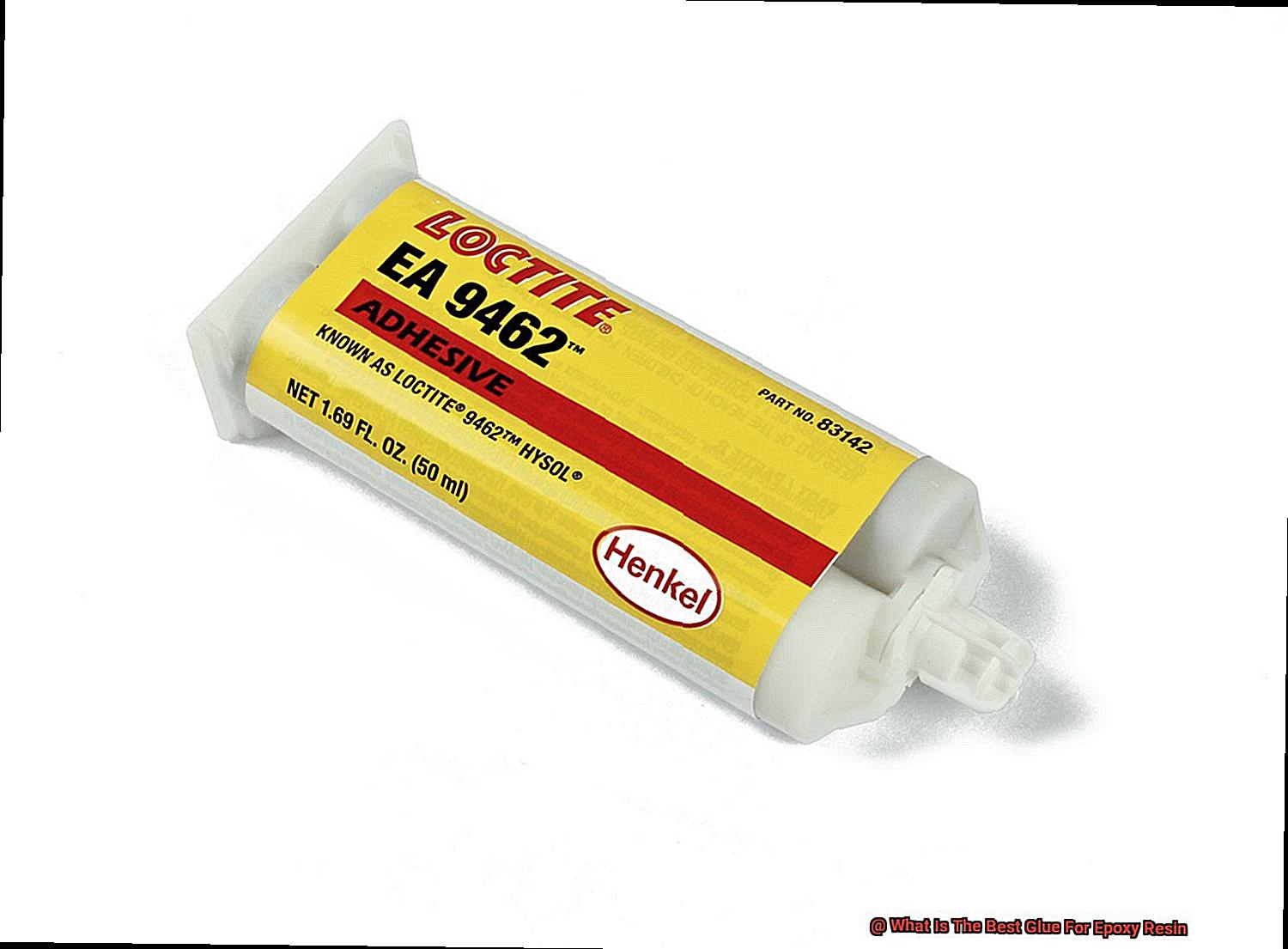
One advantage of using super glue with epoxy resin is its ability to bond quickly. This makes it an ideal choice for small-scale projects that need immediate bonding. It can also be used to bond different types of materials, such as plastic, metal, and wood, making it a versatile adhesive for various applications involving epoxy resin.
Despite its versatility and quick-drying properties, there are some limitations when it comes to using super glue with epoxy resin. For one, it may not be suitable for larger projects that require stronger bonds. Super glue can become brittle over time, which can weaken the bond between materials. Additionally, the sensitivity of super glue to moisture means that if the surface of the epoxy resin isn’t completely dry before applying the adhesive, it can weaken the bond.
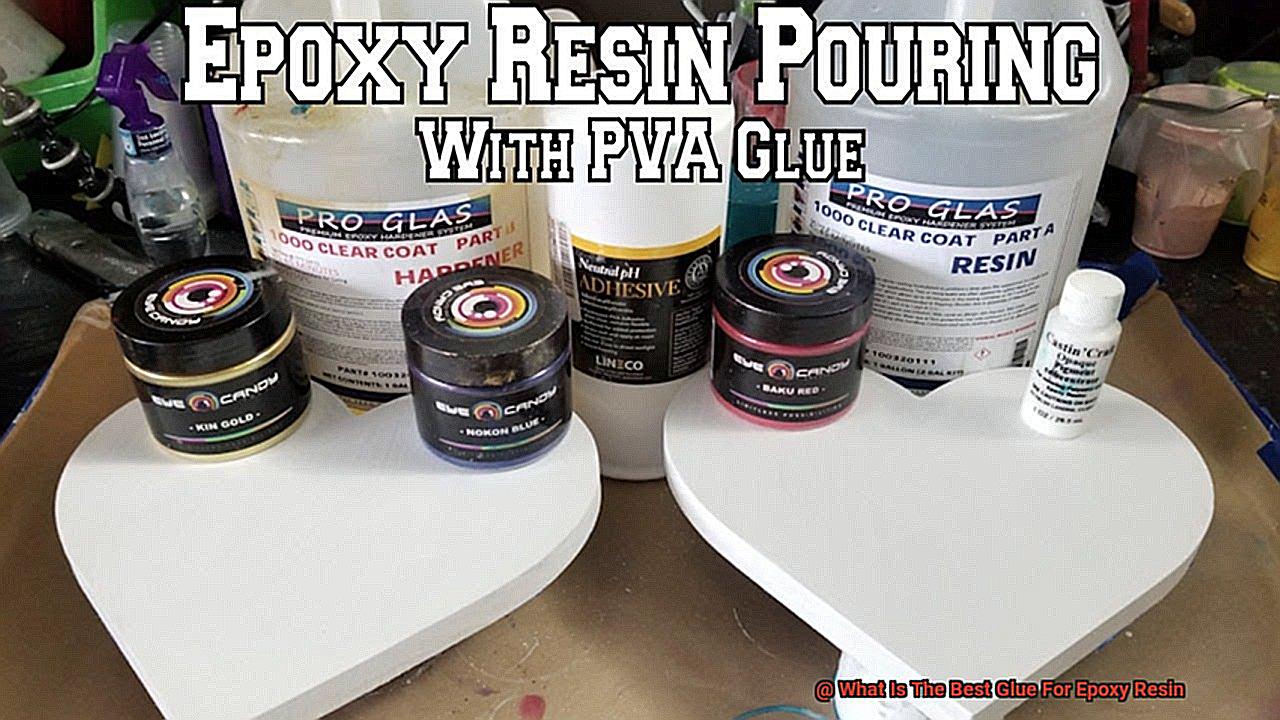
Before using super glue with epoxy resin, it is important to consider the limitations and potential risks. While cyanoacrylate (super glue) can be an effective adhesive for bonding epoxy resin in certain circumstances, it may not be the best option for larger projects or in situations where long-term durability is required.
When choosing an adhesive for your epoxy resin project, there are other options available besides super glue. Two-part epoxy adhesive, polyurethane glue, silicone glue, and hot glue are all viable alternatives that may be better suited for certain projects.
Two-Part Epoxy Glue
This type of adhesive is composed of two components, a resin and a hardener, that are combined to create a powerful and long-lasting bond. Two-part epoxy glue is versatile and can be used to bond various materials such as metal, wood, ceramic and plastic.
When selecting the perfect two-part epoxy glue for your project, there are several factors to consider. Firstly, the curing time of the adhesive is crucial. Some adhesives have a longer curing time than others, which can be an advantage or disadvantage depending on your project’s needs. If you require more time to adjust or position your materials, a slower curing time may be suitable. However, if you’re working under time constraints, a faster curing time may be necessary.
Secondly, the strength of the adhesive should also be taken into consideration. Different two-part epoxy glues vary in tensile strength, which can impact the overall durability of your bond. If you’re creating a project that will endure constant use or exposure to harsh conditions, you’ll want an adhesive with high strength to ensure longevity.
Lastly, it is essential to select an adhesive that is specifically designed for use with epoxy resin. Using the wrong type of adhesive can result in weak bonds or even damage to your materials. It’s always best to follow the manufacturer’s instructions carefully when using any type of adhesive with epoxy resin.
Polyurethane Glue
Polyurethane glue is a versatile and reliable adhesive that is popular for bonding epoxy resin to various materials. Its strong bonding properties and ability to fill gaps and cracks make it an excellent choice for a variety of projects.
One of the most significant benefits of using polyurethane glue with epoxy resin is its waterproof nature, making it ideal for outdoor projects or items exposed to moisture. Additionally, this adhesive can bond to a wide range of surfaces, including wood, metal, and plastic, giving you the flexibility to work with different materials.
However, it’s important to note that polyurethane glue can expand as it cures, which may cause issues with delicate materials or tight-fitting joints. Therefore, it’s crucial to follow the manufacturer’s instructions carefully and be mindful of how the glue will react with the materials you’re working with.
When working with two-part systems like epoxy resin and polyurethane glue, precise mixing and measuring are essential. Taking each step seriously ensures that your project turns out precisely as intended.
Factors to Consider When Choosing the Best Glue for Epoxy Resin
Firstly, it’s crucial to consider the curing time of the glue. You want to choose a glue that has a similar curing time to your epoxy resin. This ensures a strong and secure bond between the two materials.
In addition to curing time, strength is another critical factor. The glue’s strength should match your project’s needs, whether it’s a small craft or a large-scale industrial application. You don’t want your project falling apart due to a weak bond.
Temperature resistance is also crucial to keep in mind. Epoxy resin can withstand high temperatures, so it’s essential to choose a glue that can also withstand high temperatures without losing its adhesive properties. You don’t want your project melting or breaking down over time due to temperature changes.
Lastly, compatibility with both the epoxy resin and other materials used in the project is essential. Some glues may not adhere well to certain materials or may even react negatively with the epoxy resin, resulting in an unstable bond.
Tips for Using Epoxy Resin with Different Types of Glue
Using epoxy resin with different types of glue can be a game-changer in the success of your crafting or DIY project. However, there are several factors to consider to ensure a strong and lasting bond. Here are some tips that can help you make the most out of your epoxy resin and glue combination.
Choose the right glue based on the materials you’re working with
Different types of glue work better with certain materials. If you’re working with wood, using a wood glue in addition to the epoxy resin can create a stronger bond. On the other hand, if you’re working with plastic, a plastic solvent or adhesive may be more suitable. By using the right glue, you can optimize the bonding process and ensure that your project stays intact.
Ensure clean surfaces before applying glue and epoxy resin
Before applying any glue or epoxy resin, it’s important to make sure that the surfaces you’re bonding are clean and dry. Any dirt, dust, or moisture can weaken the bond and cause your project to fail. Wipe down the surfaces with a clean cloth and let them dry completely before proceeding with the gluing process.
Follow instructions carefully for both glue and epoxy resin
It’s crucial to follow the manufacturer’s instructions for both the glue and epoxy resin. This includes mixing ratios, curing times, and application methods. Skipping steps or not following instructions can lead to a weak bond or even complete failure of your project.
Do research or testing before committing to a particular glue
Not all glues work well with epoxy resin, so it’s essential to do some research or testing before committing to one for your project. Hot glue may melt under heat generated during the curing process, while some super glues may not bond well with certain materials. By testing different glues beforehand, you can save time, money, and avoid disappointment.
Use glue sparingly and test bond strength before using your project
Using too much glue can weaken the bond and cause excess dripping or messiness. Apply glue sparingly, and test the bond strength before using your project for its intended purpose. By testing beforehand, you can ensure that your project will hold up over time.
Benefits of Using the Right Type of Glue for Epoxy Resin
Look no further than choosing the right type of glue for your project. As an expert in this field, I can tell you that using the correct glue has numerous benefits that will ensure a successful and beautiful finished product.
Firstly, selecting the right glue ensures a strong and durable bond between the epoxy resin and the surface it is being applied to. By using a glue that is specifically designed for the type of surface you are working with, such as metal, wood, or plastic, you can prevent any premature failure or damage to your project. This means less frustration and more satisfaction with your hard work.
Not only will using the right glue provide a strong bond, but it will also improve the overall appearance of your project. Some glues may leave an unsightly residue or discoloration on certain surfaces, which can detract from the final result. By carefully selecting a glue that is compatible with both your epoxy resin and the surface you are working on, you can achieve a clean and polished finish that will leave a lasting impression.
Using the appropriate glue for epoxy resin can also save you time and money in the long run. If you use an inappropriate glue, it may not bond properly with the epoxy resin or surface, causing your project to fail. This can result in wasted materials, time spent redoing the project, and potentially costly repairs or replacements. By investing in the right glue from the start, you can avoid these setbacks and enjoy a successful and cost-effective outcome.
Lastly, let’s not forget about safety. Choosing the right type of glue for epoxy resin can improve safety by ensuring that harmful fumes are not emitted during application or special handling precautions are not required. By following all recommended guidelines for application and choosing a safe-to-use glue, you can ensure a successful and safe project that is free from any potential hazards.
Conclusion
To make sure your epoxy resin project is a success, selecting the right glue is essential. The bond between surfaces needs to be strong and durable, so it’s crucial to choose an adhesive that suits your needs. With so many options available, it can be overwhelming to decide which one to go for. However, by considering factors such as adhesion strength, curing time, and waterproofing capabilities, you can select the best glue for your next project.
Super glue or cyanoacrylate is a popular option that dries quickly and can bond a variety of materials. Two-part epoxy glue offers excellent bonding strength and durability, making it ideal for larger projects or surfaces. Polyurethane glue is also a suitable option for bonding epoxy resin and offers excellent bonding strength and flexibility.
When choosing an adhesive for your epoxy resin project, it’s important to consider various factors such as curing time, strength, temperature resistance, and compatibility with both the epoxy resin and other materials used in the project. Following manufacturer instructions carefully is essential when using any type of adhesive with epoxy resin.
Using the right type of glue comes with numerous benefits that will ensure a successful finished product. It provides a strong bond that enhances the overall appearance of your project while saving you time and money in the long run. Additionally, choosing a safe-to-use glue ensures that harmful fumes are not emitted during application or special handling precautions are not required.
By following these tips and guidelines when selecting an adhesive for your epoxy resin project, you can achieve seamless and professional-looking results that will last for years.

